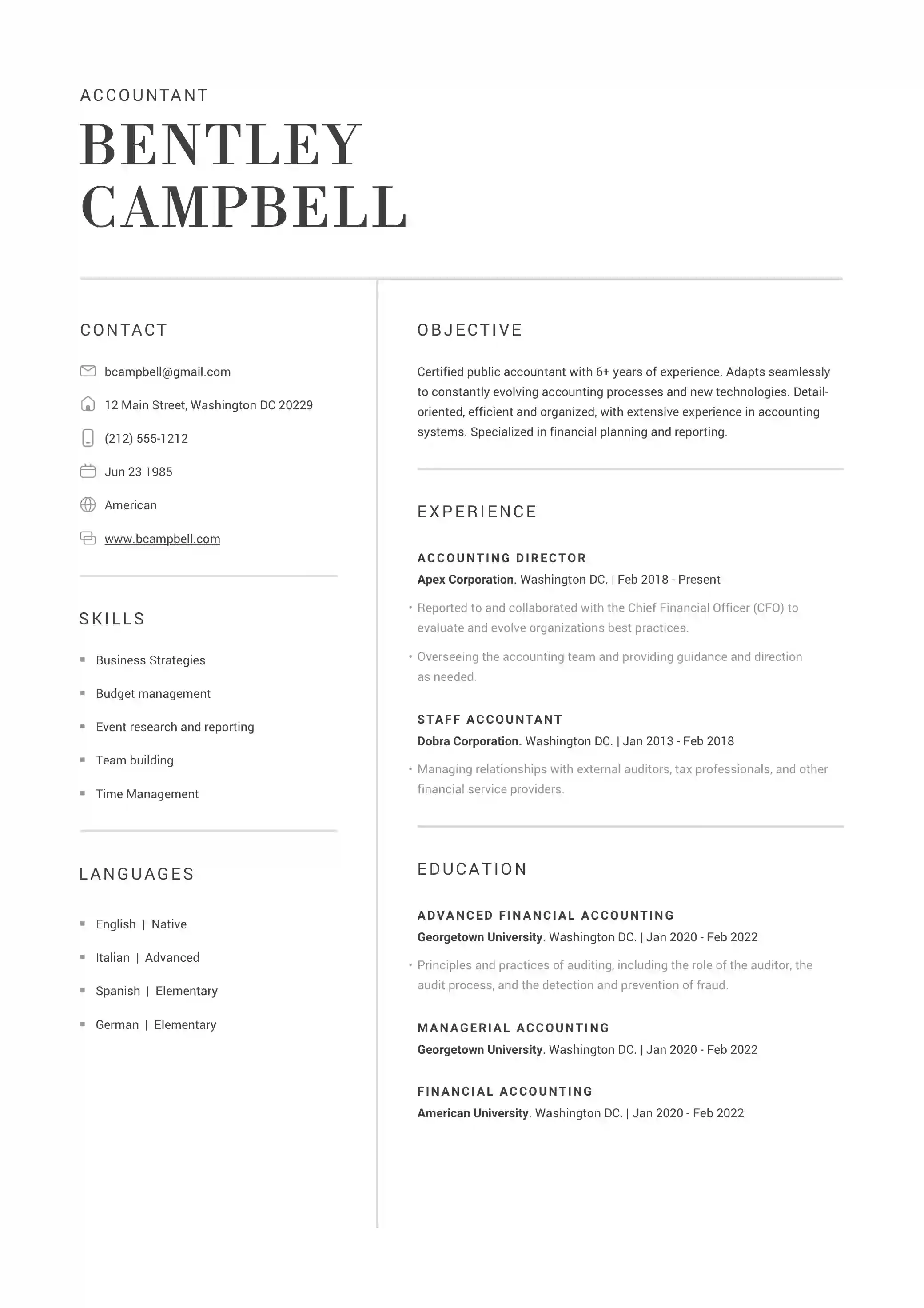
In many workplaces, things are hectic and spare time is unheard of. That is what makes time management an in-demand transferable skill. It is useful in every position and in every field, from entry-level positions to the C-suite.
How can you demonstrate time management skills on a resume? Below, we will examine the following points:
We will also share an example of a resume that demonstrates time management skills effectively.
Time management skills have been defined as “the ability to use one’s time effectively or productively, especially at work.” Put another way, these skills are “the process of organizing and planning your activities (time) in a way that it maximizes performance, efficiency, and productivity.”
Good time management skills are demonstrated by the results they produce. For example, if you can manage your time well, you will be able to meet deadlines, stay organized, prioritize tasks, and get your work done effectively. This will remain true even if your schedule or workload abruptly changes.
Joseph Ferrari, a prominent professor of psychology, suggests that 20% of adults in the United States are habitual procrastinators.
Interestingly, time management is important in one’s personal life as well. In order to maintain a healthy work/life balance, an employee should be able to finish workplace tasks without excessive overtime or “taking work home” so that work does not encroach on personal time.
This also helps keep stress to a minimum. On the flip side of this, time must be well managed in one’s personal life so that necessary tasks can be completed while not at work. Time management also plays a role in getting adequate sleep.
Are you wondering how to list time management skills on a resume? Keep reading to discover our best tips.
In order to demonstrate time management skills on your resume, you first need to cultivate good time management skills. Why not try a few of the following exercises that can help you strengthen your time management skills?
If you want to know how to word time management skills on your resume, consider this: you can list time management as a skill in your Skills section or Skills Summary. But you don’t have to. You can also demonstrate time management skills in your Experience section.
In fact, showing your time management skills is preferable to merely talking about them. Below, we’ll show you how to do just that.
How you describe your time management skills will depend on your line of work and the duties involved. For example, if you are a manager, time management might involve scheduling others – actually creating their work schedules.
Other jobs may not include this task, but you may have to meet your own deadlines, delegate tasks, manage projects, etc.
Below, we’ll consider some keywords and phrases that can indicate you know how to manage your time well – without ever typing the phrase “time management.”
Scheduling skills may be more closely related to time management than any other discrete skillset. Scheduling can involve your own time and that of others. How so?
When you have a number of daily tasks to perform or long-term projects to complete, personal scheduling is important. You may find it helpful to make lists of necessary tasks, putting the most important or most urgent at the top. You may also decide to delegate certain tasks to others.
Scheduling also involves managing others’ time. This is especially the case if you are a manager or supervisor charged with creating rotating weekly schedules for employees.
You must be a good communicator, striving to understand the unique needs and situations of each employee. You must juggle employee considerations and the demands of the project or workload.
Use the following keywords related to scheduling:
Whether they are personal goals like receiving a raise or a promotion, or task-oriented goals like finishing your report on time, achieving goals requires good time management. After all, time must be set aside for the steps needed to reach any given goal.
Goals also aid you in finding a sense of direction. When you work toward a goal, you are less likely to be distracted by less important tasks.
So, if you want to demonstrate your time management by setting goals, you might include the following phrases on your resume:
As already mentioned, prioritizing tasks is an important part of time management. Why? You may not have time to complete every task on your to-do list.
You must therefore rank them in order of importance or urgency. In this way, you can accomplish the most in the limited time you have.
Related to this is the ability to break down tasks into their constituent parts. This will allow you to allocate your time more effectively – you will be able to do each task in the order needed, rather than wasting time.
Breaking down tasks into smaller parts also helps you to determine how much time each task will take.
You can use the following terms to demonstrate these skills on your resume:
Deadlines are a crucial aspect of good time management. Deadlines help you to prioritize time-sensitive tasks, as described above.
Accountability is an important quality related to meeting your deadlines. If you are good at scheduling but don’t hold yourself (or your employees) to that deadline, your time management plan falls apart.
When we discussed prioritization, we mentioned breaking tasks down into smaller parts. This plays a role in meeting deadlines as well. You can set “mini-deadlines” commonly called benchmarks.
These benchmarks note that certain parts of a larger project have been completed. You can use the following terms to describe these skills:
There is a maxim that says “no man is an island.” This is true of time management – in most business situations, you cannot complete all the necessary tasks on your own. You need to delegate or assign some tasks to other competent workers.
Good delegation involves several parts. First, you must know your employees or coworkers well enough to understand who has the skills needed to complete the task. This requires good communication and interpersonal skills.
Next, you must be able to communicate the details of the task, including the deadlines, to the individual.
Another aspect of delegation is knowing your own limitations. For example, you might be really good at computer coding but not so good at graphic design. So, if the project involves creating a website for a client, you should delegate the graphic design tasks to someone with the needed skills.
This can rely on a personal quality – humility. You might need to cultivate modesty and a humble attitude in order to admit that you are not the best at everything.
Sometimes, delegation means outsourcing a task to a business-to-business service provider or a freelancer. Again, you will need to communicate clearly the parameters of the assignment as well as the deadline and benchmarks along the way.
You can use the following terms to describe these skills:
Having the ability to focus is an important part of time management. You may think that being able to multitask would be the best way to get things done and stay on schedule, but this is not always the case.
If you can focus your energy and attention on one project at a time, efficiency increases.
Good time managers also master the ability to shift their focus rapidly. Sometimes, something unexpected comes up and must be handled immediately.
If you can give it 100 percent of your attention and get it done, you can get back to your prioritized projects that much faster.
Having focus also reduces stress, especially in hectic work environments. Rather than wasting time by worrying over many what-ifs, you can look for and implement solutions to one problem at a time.
You can use the following terms to describe these skills:
There are a number of other skills related to time management. Specifically, these skills help you and your employees avoid wasting time by improving efficiency.
These miscellaneous skills include:
Think about it – if you use a good paperwork filing system or inventory your stock, you won’t waste time trying to find these items later.
If you manage your resources well, you won’t run out of supplies in the middle of a project, causing a delay. And if you work effectively as a team, you won’t encounter problems like duplicating effort.
Really, it is quite amazing how pervasive this necessary skill proves to be!
Are you still seeking inspiration on how to show time management skills on a resume? Consider the following examples.
As you do, pay attention to how the applicant provides concrete examples of time management skills rather than simply listing them. Our applicant is applying for a managerial position at a grocery store. Time management skills were specifically listed in the job description.
Resume Example Copy to clipboardCorey Smith
555.555.5555
coreysmith@gmail.com
123 Anywhere Street, Anywhere, NY
Skills
Work Experience
Shift manager
Captain D’s Restaurant
Anywhere, NY
2012 – 2022
Cashier
Olde Time Grocery Store
Somewhere, NY
2005 – 2011
Education
High School Diploma
2005
Anywhere High School
Anywhere, NY
Did you notice the time management-related skills that Corey highlighted? He used terms like “schedulings,” “order up time,” and “punctuality.”
He also cited specific examples of these skills in action. For instance, his efforts helped decrease the time it took to complete orders and deliver them to the customer.

Struggling with Resume Writing?
Ease the process with our templates

Including Communication Skills on Your Resume How do you demonstrate you have good communication skills on your resume? Learn some techniques for including communication skills on your resume.
Updated on June 11, 2024
Hard Skills vs Soft Skills: What Employers Look For on a Resume Find out the difference between soft skills vs. hard skills. Learn how to include these skills in your resume to show you are the right applicant for the job.
Updated on August 1, 2024
Adding Interpersonal Skills to Your Resume Boost your resume with essential Interpersonal Skills. Learn the art of highlighting communication and teamwork abilities to impress potential employers.